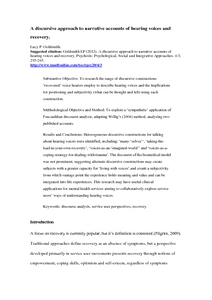Goldsmith, LP
(2011)
A discursive approach to narrative accounts of hearing voices and recovery.
Psychosis, 4 (3).
pp. 235-245.
ISSN 1752-2439
https://doi.org/10.1080/17522439.2011.590599
SGUL Authors: Goldsmith, Lucy Pollyanna
![[img]](https://openaccess.sgul.ac.uk/108189/1.hassmallThumbnailVersion/Goldsmith%20A%20discursive%20approach%20to%20narrative%20accounts%20of%20hearing%20voices%20and%20recovery.pdf)  Preview |
|
PDF
Accepted Version
Available under License ["licenses_description_publisher" not defined].
Download (208kB)
| Preview
|
Abstract
Substantive objective: To research the range of discursive constructions ‘recovered’ voice hearers employ to describe hearing voices and the implications for positioning and subjectivity (what can be thought and felt) using each construction.
Methodological objective and method: To explore a ‘sympathetic’ application of Foucauldian discourse analysis, adapting Willig’s (2008 Willig, C. 2008. Introducing Qualitative Research in Psychology, Maidenhead: Open University Press. ) method, analysing two published accounts.
Results and conclusions: Heterogeneous discursive constructions for talking about hearing voices were identified, including: ‘many-’selves’’, ‘taking-the-lead-in-your-own-recovery’, ‘voices-as-an-’imagined-world’’ and ‘voices-as-a-coping-strategy-for-dealing-with-trauma’. The discourse of the biomedical model was not prominent, suggesting alternate discursive constructions may create subjects with a greater capacity for ‘living with voices’ and create a subjectivity from which vantage point the experience holds meaning and value and can be integrated into life experiences. This research may have useful clinical applications for mental health services aiming to collaboratively explore service users’ ways of understanding hearing voices.
Statistics
Item downloaded times since 23 Sep 2016.
Actions (login required)
 |
Edit Item |


